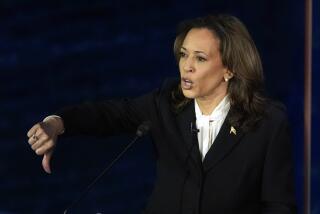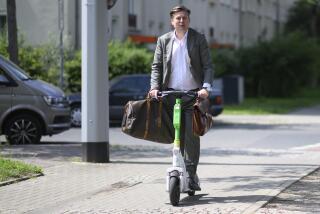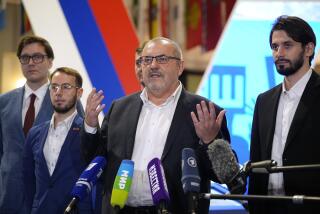POLAND : Walesa’s Unpopularity Spawns Spate of Presidential Hopefuls
- Share via
WARSAW — Lech Walesa faces reelection in seven weeks, but excuse the Polish president if he is unable to identify all of his challengers.
At last count, there were at least 31.
Seeking Walesa’s job, it seems, has become the latest craze in this newly democratic country, where less than a decade ago political campaigns were confined to the back rooms of Communist Party plenums and winners were officially the only candidates.
Today, Poland’s top post has more aspirants than the Politburo had members. And though many challengers share Walesa’s political origins in the Solidarity trade union movement, the electoral free-for-all has no bounds: The most popular candidate made a career as an official in the last Communist regime.
“Every Pole now feels he can try to become president,” said Marcin Krol, a political analyst who writes for the Warsaw daily newspaper Sztandard. “It is part of democracy. The newspaper gets a letter from a new candidate practically every day.”
The list of would-be presidents spans the powerful and the frivolous, including the chief justice of the Supreme Court and a Warsaw engineer who would clothe the nation in purple because he believes that the color carries magical powers.
A leading contender is the head of the Polish national bank, who was plucked from academic obscurity by Walesa for the job. Another prominent challenger is the country’s ombudsman, a one-man consumer complaint service, government watchdog and social conscience.
One candidate claims to have invented a “perpetual motion machine” that defies the laws of physics. Another says he has evidence that Pope John Paul II, and practically all other prominent Poles, are Jewish. A well-known cabaret performer wants the job, as does a small-town mechanic who has designed orthopedic shoe inserts that he says prevent AIDS.
“For some of these people, this is a children’s disease found in a young, emerging democracy,” said Janusz Czapinski, a psychologist at Warsaw University. “For others, it is an occasion to sell something . . . to become known or to remind people of their existence.”
A popular rightist candidate clumped through the cobblestone streets of Old Town Warsaw on an elephant to show his admiration for the American Grand Old Party. A millionaire businessman, meanwhile, recruited campaign workers through the Internet, offering to pay $1 for each signature needed to qualify for the Nov. 5 ballot.
The front-runner is Aleksander Kwasniewski, a telegenic former Communist sports minister who has consistently outpolled Walesa in opinion surveys. Kwasniewski heads a left-wing party of ex-Communists, who have controlled the Polish Parliament for nearly two years.
In a recent poll, Kwasniewski led Walesa by nearly 3 to 1. The survey also showed the incumbent president trailed Hanna Gronkiewicz-Waltz, the bank president, and Jacek Kuron, an anti-Communist dissident who was nominated by the main opposition party.
*
Walesa’s unpopularity, analysts say, has fueled the proliferation of challengers, some of whom hope to repeat his fairy-tale rise from shipyard electrician to leader of Poland. As president, Walesa’s erratic and often cantankerous style has cost him support, as has the impression among the worst-off that he did not deliver on his many promises.
Five years ago, only half as many people lined up for Poland’s first free direct presidential election. Just six qualified for the ballot, with Walesa winning in a runoff against businessman Stanislaw Tyminski, a Polish emigre living in Canada who has entered the race again. (He made the Internet solicitation.)
The main stumbling block then, and now, is the requirement to collect 100,000 signatures. So far only Walesa and elephant-riding Janusz Korwin-Mikke, a cybernetics specialist who wants to slash the Polish government, have submitted signatures to the electoral commission. The deadline for the others is Sept. 28.
More to Read
Sign up for Essential California
The most important California stories and recommendations in your inbox every morning.
You may occasionally receive promotional content from the Los Angeles Times.










